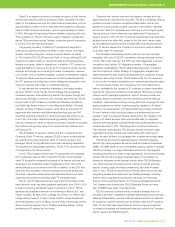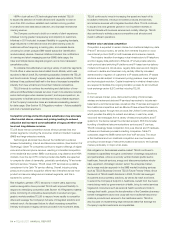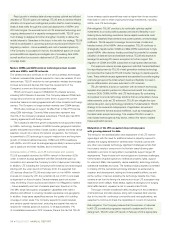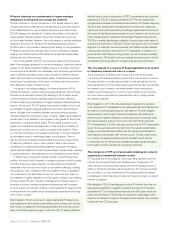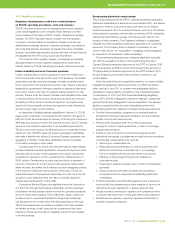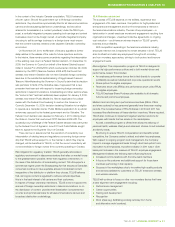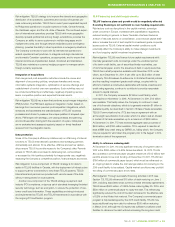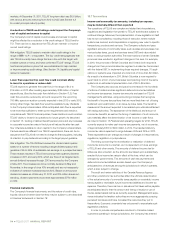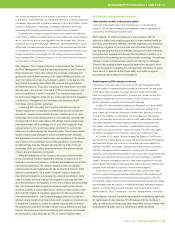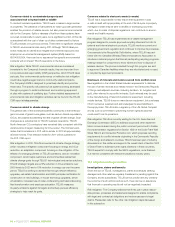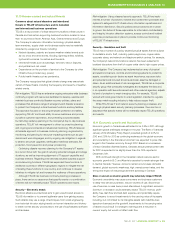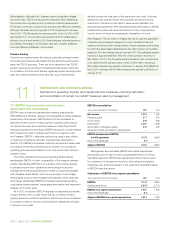Telus 2011 Annual Report Download - page 95
Download and view the complete annual report
Please find page 95 of the 2011 Telus annual report below. You can navigate through the pages in the report by either clicking on the pages listed below, or by using the keyword search tool below to find specific information within the annual report.
TELUS 2011 ANNUAL REPORT . 91
MANAGEMENT’S DISCUSSION & ANALYSIS: 10
In the context of the Industry Canada consultation, TELUS advanced
a fourth option: Should the government opt to lift foreign ownership
restrictions, they should be symmetrically lifted for all telecommunications
carriers and broadcasting distribution undertakings, and should be
retained for broadcasters (i.e. content providers). Under the TELUS pro-
posal, a vertically integrated company operating both carriage and content
businesses could not be foreign owned. A vertically integrated company
choosing to sell its carriage business to a foreign buyer must ensure
that the content business remains under separate Canadian ownership
and control.
On November 29, 2011, the Minister of Industry signalled a further
delay relative to the release of the rules for future spectrum auctions.
In the interim, there remains some uncertainty regarding the interpretation
of the existing rules due to a Federal Cabinet decision. On December 10,
2009, the Governor in Council (on behalf of the federal Cabinet) issued
Order in Council P.C. 2009-2008, which overturned an October 29, 2009,
decision by the CRTC (Telecom Decision 2009-678) that found that
wireless new entrant Globalive did not meet Canada’s foreign ownership
laws due to the substantial capital backing of Egypt-based Orascom
Telecom. Notwithstanding the Governor in Council’s claim that its decision
was particular to facts of the Globalive case, it appeared that a new
precedent had been set with respect to loosening foreign ownership
restrictions in telecommunications, broadcasting and other sectors where
the “control in fact” test has traditionally been applied. On January 8, 2010,
wireless new entrant Public Mobile Inc. filed an application for judicial
review with the Federal Court seeking to overturn the Governor in
Council’s December 10, 2009, decision declaring Globalive to be eligible
to operate as a Canadian carrier. Public Mobile’s application for a judicial
review was opposed by the federal government and by Globalive. The
Federal Court decision was released on February 4, 2011, striking down
the Order in Council that overturned CRTC Decision 2009-678. The
successful court challenge of the Federal Cabinet decision was overturned
by the Federal Court of Appeal in June 2011 and Public Mobile sought
leave to appeal to the Supreme Court of Canada.
There can be no assurance that the resolution of uncertainty over
interpretation of existing laws and regulations concerning foreign owner-
ship that TELUS will be subject to, or the manner in which they may be
changed, will be beneficial to TELUS, or that the current uncertainty will
not be beneficial to foreign-owned firms currently operating in Canada.
Risk mitigation for regulatory matters: TELUS generally advocates a
regulatory environment in telecommunications that relies on market forces
to the greatest extent possible, rather than regulatory intervention. In
the case of the distribution of broadcasting content, TELUS supports a
symmetrical regime under the Broadcasting Act that ensures all Canadian
consumers continue to have equitable access to broadcast content
irrespective of the distributor or platform they choose. TELUS believes
that, as long as content is regulated to achieve cultural objectives,
this is in the best interest of all carriers and their customers.
In respect of foreign ownership restrictions, TELUS does not oppose the
removal of foreign ownership restrictions in telecommunications, or on
the distribution of content, provided that liberalization is implemented
on a fair and symmetrical basis for all telecommunications carriers and
broadcast distribution undertakings.
10.4 Human resources
The success of TELUS depends on the abilities, experience and
engagement of its team members. Competition for highly skilled and
entrepreneurial management and front-line employees is intense in
the telecommunications industry. The loss of key employees – or
deterioration in overall employee morale and engagement resulting from
organizational changes, unresolved collective agreements or ongoing
cost reduction – could have an adverse impact on TELUS’ growth,
business and profitability.
With competition expanding in the telecommunications industry,
employee retention risk is expected to remain elevated in 2012. TELUS
aims to attract and retain key employees through both monetary
and non-monetary approaches, striving to both protect and improve
engagement levels.
Risk mitigation: The compensation program at TELUS is designed to
support its high-performance culture and is both market-driven and
performance-based. This includes:
.An employee performance bonus that is tied directly to corporate
profitability as well as individual and corporate operational results
.Share options for eligible employees
.Restricted stock units (RSUs) and performance stock units (PSUs)
for eligible employees
.TELUS Employee Share Purchase plan available to all domestic
full-time and part-time employees.
Medium-term and long-term performance incentives (RSUs, PSUs
and share options) for key personnel generally have three-year vesting
periods. The increased value of TELUS shares in 2010 and 2011 has
increased the effectiveness of these retention incentives. Where required,
TELUS also continues to implement targeted retention solutions for
employees with talents that are scarce in the marketplace.
As well, a benefits program is offered that allows the tailoring of
personal health, wellness, lifestyle and retirement choices to suit individual
and family needs.
By striving to ensure TELUS’ compensation and benefits remain
competitive, the Company seeks to attract and retain key employees.
With respect to ongoing program cost management, the Company
hopes to manage engagement levels through direct and upfront com-
munication to all employees. A positive indicator in 2011 was a 1,300
basis point increase in the measure of TELUS’ employee engagement.
Management believes the following were influencing factors:
.Increased communications with front-line team members
.A focus on the customer and additional support for those team
members performing in that capacity
.Success in the marketplace due to innovative high-quality products
and services available to customers on TELUS’ enhanced wireless
and wireline networks.
TELUS will continue to focus on other non-monetary factors that have
a clear alignment with engagement including:
.Performance management
.Career opportunities
.Training and development
.Recognition
.Work styles (e.g. facilitating working remotely from home
and alternative work locations).


